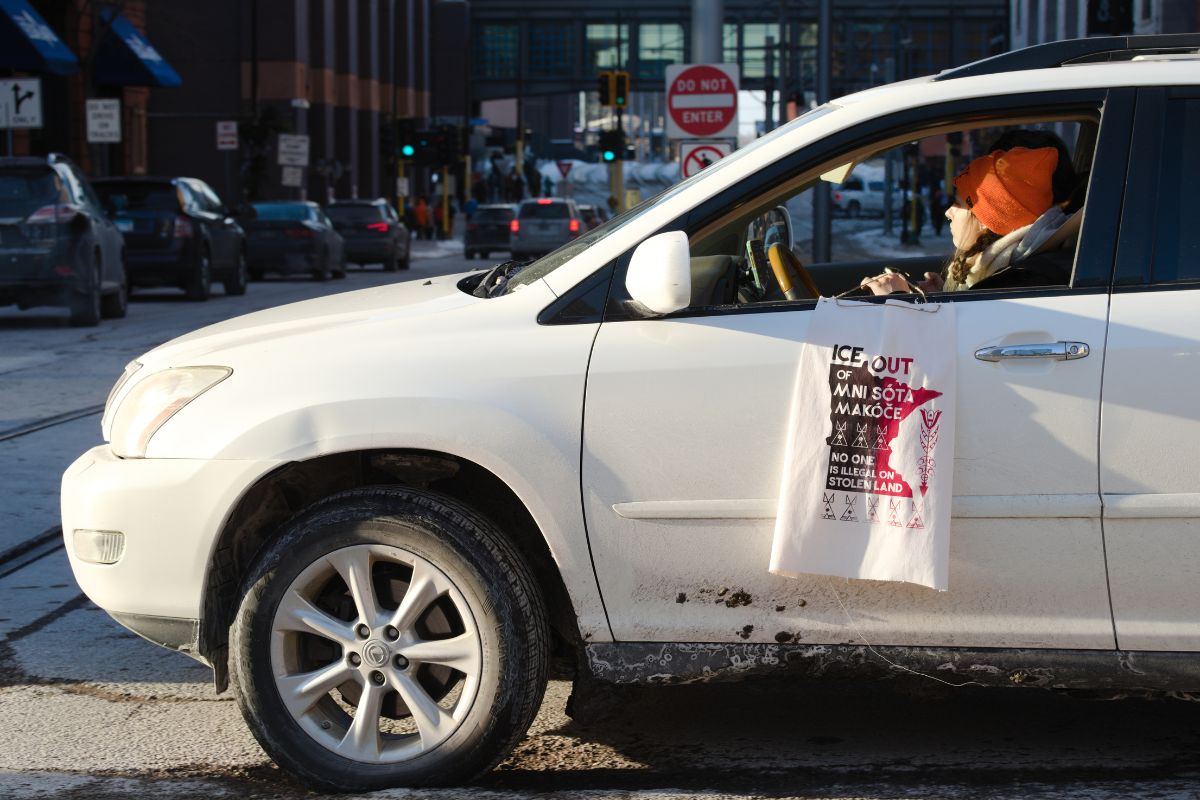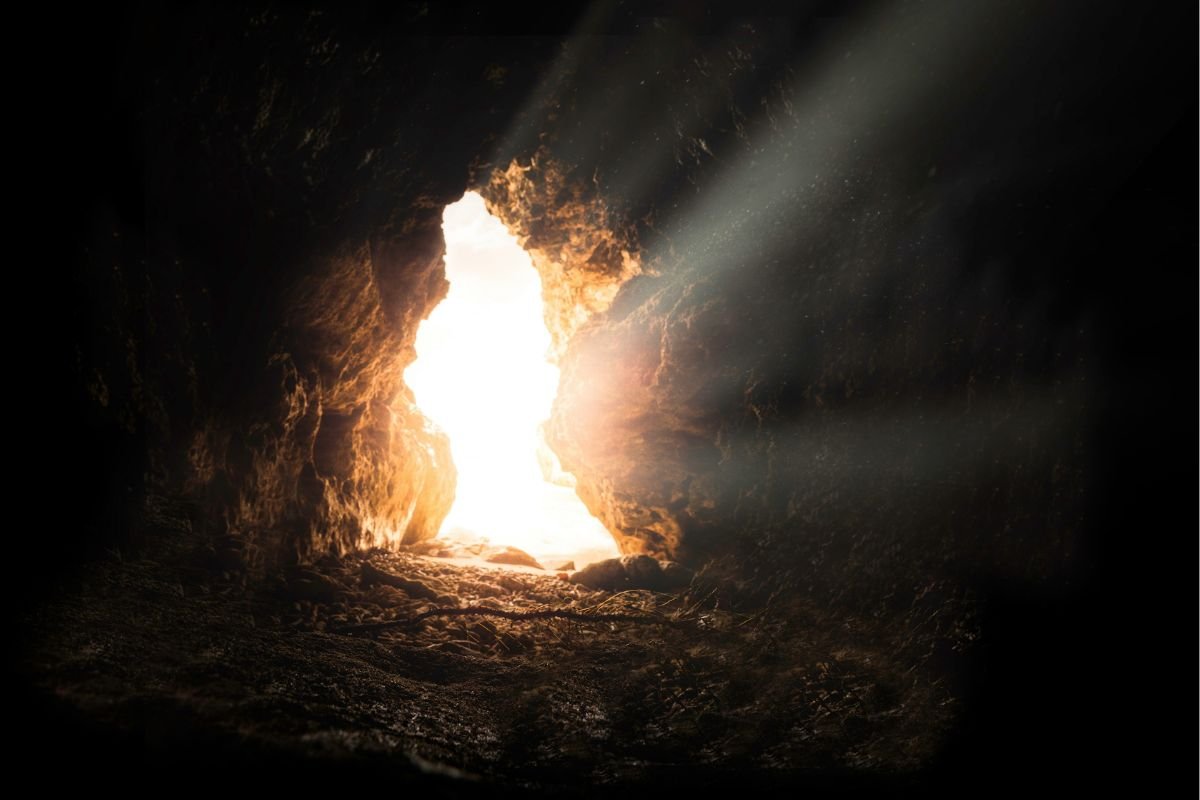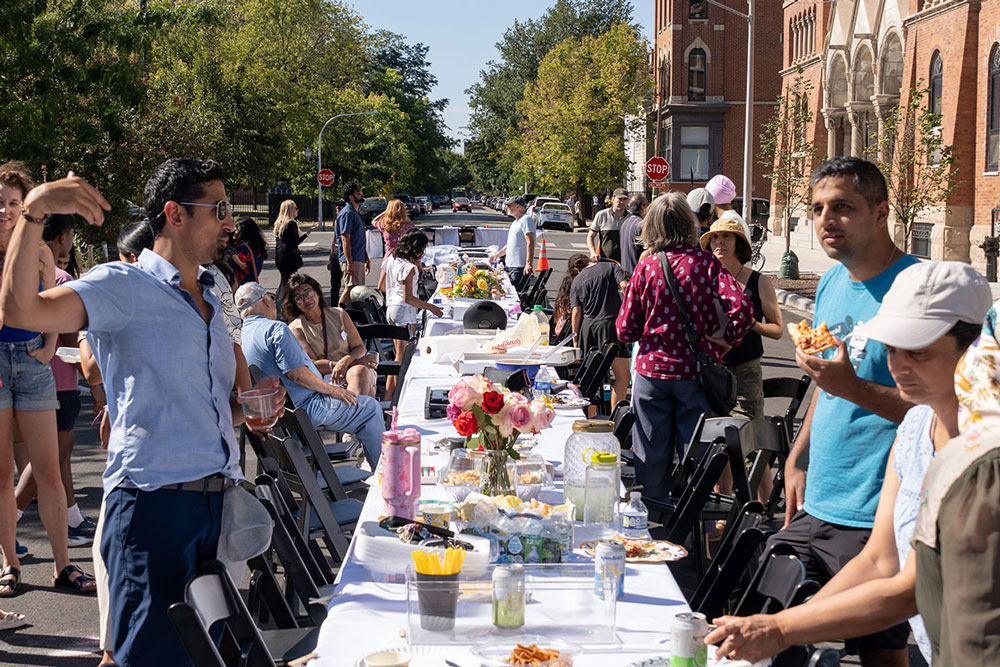Kendra Hicks, Director of Radical Philanthropy at Resist, convened Justice is Essential, a three-part series. This conversation on “creative resistance” between adrienne maree brown and Toshi Reagon took place on February 17, 2021. In this excerpt, the speakers discuss the role of individuals in creative change and how paradigm shift is a lot like speculative sci-fi, because it requires imagining a world we have not lived in yet.
Kendra Hicks: I want to move us to the next part of our conversation, and I want to anchor us in this quote from The Radical Imagination: Social Movement Research in the Age of Austerity by Alex Khasnabish and Max Haiven. And the quote reads, “At its most superficial, the radical imagination is the ability to imagine the world, life, and social institutions not as they are, but as they might otherwise be. It is the courage and the intelligence to recognize that the world can and should be changed.” And so, I want us to invite us to zoom out beyond the “I” into the “We” collective space, because so much of the work of liberation is creative, speculative work. This is a muscle that both Toshi and adrienne, you work on often. How have you seen, in your work, movements, organizers, artists, using their radical imagination and building a collective creative practice as a response to the uprisings and the pandemic?
adrienne maree brown: What you see out there, Toshi? [Toshi: Huh?] What do you see?
Toshi Reagon: Well, first of all, I love “I”s. And I will testify the “I”s are the best “we”s. You know, during the Civil Rights movement, “We Shall Overcome”? My godfather, Pete Seeger, changed the words to “We Shall Overcome,” but the words were, “I’ll overcome.” It’s a “I” song. And “this little light of mine, I’m gonna let it shine,” it’s an “I” song. I really love “I”s. And the reason why I love “I”s is because I think you can’t get no “we”s without “I”s.
adrienne maree brown: Keep it fractal, baby.
Toshi Reagon: Yes. And lots of times people will be like “We”—you know, they in a room—“We gonna…” you know, do something. But if every single person in that room has not said “I’m going to do something,” then the “we” is not going to happen. And so, I really adore…I guess, a couple of examples I have is you, adrienne maree brown, and your incredible, deep scholarship and love of Octavia Butler’s Parables. It might be one of the best examples of this that I have, but it’s like, it’s so multilayered what you’ve done with the three books. They’re all really different; they all cover different territory. They’re all community books, which means your voice is not the only voice in any of the books. Like, I forgot I was in this, Emergent Strategy. Somebody took a picture of my quote and sent it back to me, and I was like, wait, did I say that? So, it is you, expanding, opening up multiple venues or pathways or whatever, and then, you know, all of the people coming in. And it makes a great vibe, vibration—we use “vibration” forever—but it’s text, but you can feel it, it’s tangible. Because it’s so—I can’t tell you how many people have found themselves a room inside of one or all of those books. And even in our exploration, when we’ve been doing Octavia Parables, we often refer back to something in one of those books that somebody did.
So that, and then the other is, I had a really powerful experience in my other homeland of Durham, North Carolina. Our good friend Manju and another good friend were texting me and was like, you have to come down and teach us a song. So I was like, I mean, I’m happy to teach songs, but they were like, “No, you need to come down on this date and teach a song.” And the idea was, here they are, basically imagining, you know, a free place of Durham, North Carolina, without specifically the violence of the police, and specifically of the violence of legislative decisions that would actually not take care of the community. And they imagined it, because they know it can happen, and they know it’s true, and this is a great activist community.
So, basically, a city council meeting is coming up. There’s $93 million on the table, and the police are like, “We should have it. It belongs to us. We need to hire more police.” And they were like, “No, we don’t see that. What we do see is taking care of workers, public workers who haven’t gotten a salary bump in forever. What we do see is taking care of people who are being kicked out of their homes. What we do see is….” They saw all of these things, and they said it could happen, and so they created a movement towards it. They wrote out the plan. They were like, this is how you do it. They wrote the document—absolutely gorgeous document—then they made a circle. And in this circle, because the imagination can work multiple ways, you can imagine the steps of the past. And so, they actually were like, how can we show our community how important it is for us to see this now? Because we know before, when people have seeded things, it might take two years, five years, eight years, 10 years, 15 years, but they get things done.
adrienne marie brown: [interspersed] Yes. Yes. Yes. Yes. Yes.
Toshi Reagon: And so, then, they brought the representation into the space.
Sign up for our free newsletters
Subscribe to NPQ's newsletters to have our top stories delivered directly to your inbox.
By signing up, you agree to our privacy policy and terms of use, and to receive messages from NPQ and our partners.
So, they won that victory. I came and sang, taught them this song. They went to the city council, and they did a whole bunch of things. But they got up and had 80 people get up and sing this song.
adrienne maree brown: Exactly. I love that.
Toshi Reagon: And they won, so. A lot of “I”s.
adrienne maree brown: Exactly. Well, it’s beautiful. Because I think that’s it. I mean, we’re on the same wavelength here. First of all, I love it that I was on your list of examples, because you’re also on my list of examples, which is why we work together. But I was thinking of the work that you did, from you and your mom seeing the Parables and being like, this is something that we need to bring to community, to then turning it into the opera, to then turning that into a community engagement strategy. Right? That was like, every time the Parables opera come someplace, you totally have the permission. And people would be very satisfied if you just showed up, sang, and left. We would all just be like, “Thank you, thank you, thank you. ‘God is Change.’ I’m full.” Instead of doing it that way, each time, you have shown up and turned it into an opportunity to say, how does this community need to engage with these songs and this journey and this process? What is the path, the Parable path, for this community? And I feel like that, to me, is one of the ways we take the—you know, I feel like I’ve been following in your footsteps tried to learn, like, okay, how do I take my own creative impulse and nourish it, you know, as much as it needs to be nourished inside myself? Which I feel like you did with the standards; you were like, this is what the sound needs to be like. It’s going to be like this, older. The vocals are going to sound like this. It’s not just going to be any old teenybopper-whatever. This is a specific timbre that we’re looking for. And so, you’re like, meeting your own need as an artist, but then also partnering with others.
And I’ll say, for this Black History Month—and also, earlier, when the pandemic first started—I did a series of prompts, just on Instagram, of just, like, here’s some prompts to write poems around. And now I’m doing the same thing for Black History Month where I’m like, here’s some prompts. These are things that I’m writing, that are my personal writing practice, that are helping me to bring Black history into the present, because time is nonlinear, and time is a construct, and all of these things are still happening to us right now. But I was like, what if I offer the prompts out and see what comes back? And I’ve been getting all these beautiful DMs and messages and videos from people who are like, “I made a poem. I wrote a story. I talked to my grandmother. I had this experience.”
So, on one level, I think that the “I” to the “We” is like, there’s something about really listening for what feels most nourishing to me as an artist, and how do I invite other people in to join me in that dance? And then I also, I love that defunding, or redistribution of resources from the police is also on your list, ’cause I’m like, that is a visionary directive. Like, that right there is a visionary creative directive, because in order—like, when people hear “defund the police,” it activates their imagination immediately, whether they realize it or not. And for some people, their imagination is like, “What? That could never happen!” Their imagination shuts them down, right? And then you have to contend with that. Like, why can’t I even imagine that? And for other people, they start asking the question of like, “What does it mean to defund the police? How do we deal?”
You know, the first question that people come up with is, “Well, what about the worst humans? What about the worst humans?” Like, if we don’t have the police, the worst humans are going to take over. To which we respond, the worst humans are in charge currently. The worst humans have already taken over, they’ve been in charge. They’re the ones who have this system in motion. The worst humans are the ones who have us going to unnecessary wars and closing borders where children and parents are trying to cross. The worst humans are the ones who have us locked up in jails and the ones who have continued the enslavement system through these prisons. The worst humans are the ones who are destroying our planet. The worst humans have been in charge for 250 years in this country, and what we’re saying is we want some of the other humans to have an opportunity to experiment with what it would look like to try other methods that address our mental health, and our physical health, and our spiritual health, and our well-being in our communities. So, to me, I love when we land those things.
And you know, we know we’re on the right track when humans who have major power are like, “Don’t say that. Don’t even plant that seed.” We’re like, oh, seed planted; we are all gardeners, because gardeners and farmers are also the creative visionaries of the world. So, I really think that Movement for Black Lives right now is on to something. Like, I think it’s full of creatives and has been, like, letting that unleash amongst our people, that now—I mean, I don’t know if it feels this way to you, but now, when I see movement in the streets, when I attend a march or a gathering, we’re so much more centered around that dance, the art, the celebration of our aliveness, as opposed to the focus on our death, right? Even when we are showing up to combat a death that has happened, we’re showing up with a second line mentality, right, that we will celebrate our aliveness, and we will keep moving towards aliveness even as we make these demands. And I think that, to me, that’s a trend I want us to keep following, because then the other thing we’re constantly trying to create is a larger and larger and larger movement for justice so that ultimately everyone can see themselves inside of a justice future, a liberated future. And I think that creativity, the way that we practice it—not as an aside or an addendum to movement, but as a heart of movement, the vision, the beauty, the songs are the heart of it—I think that becomes the beating pulse that everyone can move towards and is compelled towards, right? We want to be that light in the dark, right? I think about, it’s like we have to be the light in the dark.
Toshi Reagon: I love this, and I love this. You know, I hope it’s still up on YouTube, but Movement for Black Lives National Convention is such a powerful, collaborative motion. And you know, talk about the “We” and the “I,” and the jumps to the imagination. Like, it’s—everything is in there. [adrienne: It’s all in there.] I’m really begging for them to reintroduce that piece to the public in a way that it can stay contemporary. Because you know, people are like, “Well, the convention is over.” I’m like, no, but all of these things you need to see, like, they’re all in action.
adrienne maree brown: But it’s also a documentary on like, what all needs what. I think it’s so important because it also shows that, you know, to be an organizer is a fundamentally creative act, right? That’s why when we were talking about Octavia’s Brood, we were like, all organizing is science fiction, you know? It’s that we are dreaming and co-creating a world that we have not lived in. We’ve never experienced it. We have no reason to be so committed to it other than that our visions tell us that there’s a better way, there’s another way. And I’m like, to me, when we see what movements are up to right now—and not just in the US, right? I think that there’s also a global unfurling of this visionary creative. You know, I look at the farmers in India. I look at what’s happening in Lebanon. I look at what’s happening in Puerto Rico. I look at all these places, and I’m like, yeah, we’re on to something. We’re recognizing that the age of controlled monocultural endeavors is coming to an end. The supremacy-based endeavors are coming to an end. And there’s a ton of room for our diversity: our biodiversity, our creative diversity, and our remembering. All of our peoples, we started a song. We started with song; we had songs that gave us instructions for how to be here. And now it’s time to listen for those again.












